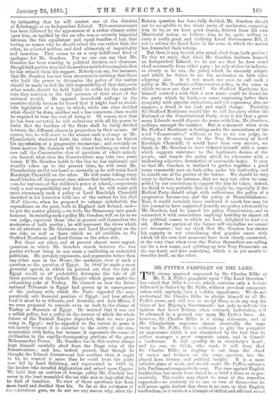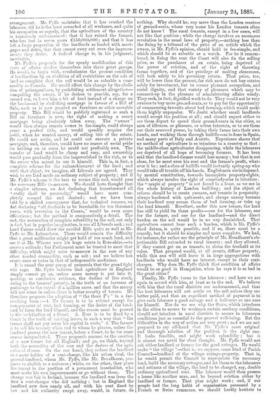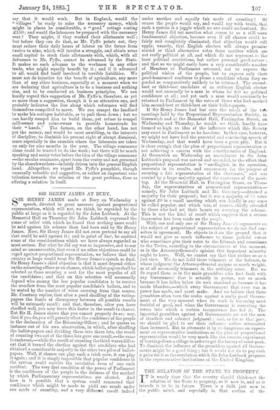MR. FYFFE'S PAMPHLET ON THE LAND. MR. FYFFE'S PAMPHLET ON THE LAND.
THE strong approval expressed by Sir Charles Dilke of Mr. C. A. Fyffe's pamphlet upon "The Land Question" has raised that little brochure, which contains only a lecture delivered in Oxford by Mr. Fyffe, without previous communication with anybody, into a sudden importance. We do not understand Sir Charles Dilke to pledge himself to all Mr. Fyffe's views, and still less to accept them as in any way the views of her Majesty's Government ; but only to indicate his opinion that Land Reform, when seriously undertaken, will be advanced in a general way upon Mr. Fyffe's lines. As, however, Sir Charles Dilke is a rising statesman, and as Mr. Chamberlain expresses almost identically the same views as Mr. Fyffe, this is sufficient to give the pamphlet an importance which is not diminished by the fact that its author manages a great corporate estate, and is himself a landowner. It will speedily be in everybody's hanct;: and no one, we think, who reads it will deny that Sir Charles Mire, in singling it out from the cloud of essays and lectures on the same question, has dis
played keen literary and political insight. It is a most valuable piece of work, and should make Mr. Fyffe's entrance into Parliament comparatively easy. The case against English landlordism has never been stated in so brief a form or so persuasively. The reader may object to some of the remedies suggested—we certainly do to one or two of them—but he will never again declare that there is no ease, or that English landlordism, as it exists, is a triumph of skilful and efficient sociat arrangement. Mr. Fyffe maintains that it has crushed the labourer, till he is the least rewarded of all workmen, and quits his occupation so eagerly, that the agriculture of the country is injuriously undermanned ; that it has ruined the farmer, who has lost ía seven years £150,000,000; and that it has left a large proportion of the landlords so loaded with mortgages and debts, that they cannot carry out even the improvements they desire. A radical change is, in his judgment, inevitable.
Mr. Fyffe's proposals for the speedy modification of this state of affairs resolve themselves into three great groups. He would, to begin with, revolutionise the present condition of landlordism by an abolition of all restrictions on the sale of land so complete that the soil would be as saleable a commodity as Consols. He would effect this change by the abolition of primogeniture, by prohibiting settlement altogether— compelling the owner, if he desires to provide, say, for a second son, to leave him a bit of land instead of a charge on the land—and by abolishing mortgage in favour of a Bill of Sale, such as is now granted on furniture or other movable property. This Bill would be publicly registered as such a Bill on furniture is now, the right of making a secret mortgage being absolutely taken away. The " owner " would then always remain owner in fee-simple, could always grant a perfect title, and would speedily acquire the habit, when he wanted money, of selling bits of the estate. He could not settle, and he could not execute a private mortgage, and, therefore, would have no reason of social pride for holding on to acres he could not profitably own. The transfer of land would be cheap and easy, and ownership would pass gradually from the impoverished to the rich, or to the owner who meant to use it himself. This is, in fact, a complete scheme for the enfranchisement of the land ; and with that object, we imagine, all Liberals are agreed. They wish to see land made an ordinary subject of property ; and if Mr. Fyffe's scheme is the best to secure this end, would pass the necessary Bills to-morrow. We should have thought that a simpler scheme, an Act declaring that henceforward all " realty shall be personalty," would have more completely secured the end desired ; and we have been told by a skilled conveyancer that, for technical reasons, an Act declaring "all freeholds to be leaseholds for ten thousand years, with reversion to the Crown," would be even more efficacious ; but the method is comparatively a detail. The end, the restoration of complete saleability to the soil, not only in fact, but in popular imagination, is one all Liberals seek ; and Lord Cairns could draw the needful Bills quite as well as Mr. Fyffe or Mr. Laboucliere. There would remain the difficulty that a great millionaire might get hold of too much land, and use it as Mr. Winans uses his huge estate in Ross-shire,—to create a solitude ; but Parliament must be trusted to meet that difficulty, which might arise to-morrow in the case of any other needed commodity, such as salt ; and we believe has arisen once or twice in that of indispensable medicines.
It is round the next group of proposals that the grand fight will rage. Mr. Fyffe believes that agriculture in England simply cannot go on, unless more money is put into it, quoting, as conclusive evidence, the decline of live stock, owing to the farmers' poverty, in the teeth of an increase of pasturage to the extent of a million acres, and that the money will not come in unless there is better security of tenure. Ile therefore proposes the adoption of "the three F's" in a farreaching form :-1. No farmer is to be evicted except for non-payment of rent, bad farming, or the desire of the landlord to farm the land himself, and the reason must be proved to the satisfaction of a Court. 2. Rent is to be fixed by a Court in the teeth of existing leases, in such a way that "the tenant shall not pay away his capital in rents." 3. The farmer is to sell his tenancy when and to whom he pleases, unless the landlord proves the new tenant, before a Court, to be for some reason incapacitated. These proposals amount to the creation of a new tenure for all England ; and go, we think, beyond both the necessities of the case and the desires of the agricultural classes. On the one hand, they reduce the landlord to a mere holder of a rent-charge, like his urban rival, the ground-landlord, whom Mr. Fyffe, like Mr. Broadhurst, proposes to abolish as a nuisance ; while, on the other, they place the tenant in the position of a permanent leaseholder, who must make his own improvements or go without them. The change was fair in Ireland, because the landlord was from the first a rent-charger who did nothing ; but in England the landlord now does nearly all, and with his rent fixed by law and his authority swept away, would, in future, do
nothing. Why should he, any more than the London receiver of ground-rents' whose very name his London tenants often do not know ? The rural tenants, except in a few cases, will not like that position ; while the change involves an enormous revolution in the usual laws of property,—nothing leas than the fixing by a tribunal of the price of an article which the owner, in Mr. Fyffe's opinion, should hold in fee-simple, and which should be as saleable as a watch. For be it remembered, in fixing the rent the Court will also fix the selling price, as the purchaser of an estate, being deprived of the power of eviction, and of the right of throwing farms together, and of the privilege of making clearances, will look solely to his pecuniary return. That price, too, will be lower than the present, for rich men do not buy estates solely for investment, but to secure pleasant occupation, and social dignity, and that variety of pleasures which may be summed-up in the pleasure of administering affairs wisely. They seek, in fact, dignified work to do. They would not be very anxious to buy mere ground-rents, or to pay for the opportunity of commencing lawsuits about bad farming, which would make them highly unpopular. We doubt whether small landlords would accept the position at all ; and should expect either to see them depart to spend their ground-rents in the cities, as men of idleness, or pleasure, or urban interests, or to see them use their reserved power, by taking their farms into their own hands, and working them through bailiffs—as is done in Spain, and many parts of Italy and Austria. Experience shows that no method of agriculture is so injurious to a country as that ; the middle-class agriculturist disappearing, while the labourers are deprived of all hope of becoming farmers. It has been said that the landlord-farmer would lose money ; but that is not clear, for he must earn his rent and the farmer's profit, whatever it be ; and a class of bailiffs would instantly spring-up who would take all trouble off his hands. Englishmen are indisposed, by mental constitution towards incomplete property-rights, which always involve the right of somebody-else to interfere ; the " magic of property" is not found in a lease, as we see in the whole history of London building; and the object of reform should be to create yeomen, not tenants in perpetuity, always burdened with quit-rents, and always uneasy because their landlord may accuse them of bad farming, or take up the land himself. Recollect, under this new tenure, the land has still to yield its three profits—one for the labourer, one for the farmer, and one for the landlord—and the direct burden on the soil would be in no way diminished. That agriculture cannot bear such a burden, which is Mr. Fyffe's fixed datum, is quite possible, and if so, there must be a remedy, but it should be simpler and more complete. We had, for instance, far rather see the principle of Mr. Broadhurst's objectionable Bill extended to rural tenants ; and they allowed, if they cannot get on as tenants, to claim the freehold at its value. That proposal would, at all events, diffuse property, while this one will still leave it in large aggregations with landlords who would have no interest, except in their rentcharges. Why does Mr. Fyffe think that condition of affairs would be so good in Hampshire, when he says it is so bad in the great cities Finally, Mr. Fyffe turns to the labourer ; and here we are again in accord with him, at least as to the end. We believe with him that the rural districts are undermanned, and that the best labourers will not settle on the soil unless they are better paid, and that an expedient method of payment is to give each labourer a good cottage and a half-acre or one acre for himself. Nor do we see why the State, which interferes in the cities to secure to workmen certain sanitary conditions, should not interfere in rural districts to secure to labourers conditions just as essential to the general well-being. But the difficulties in the way of action are very great ; and we are not prepared to say off-hand that Mr. Fyffe's most original and thorough solution of the problem is the right one. It looks feasible, and might work splendidly ; but it is almost too novel for clear thought. Mr. Fyffe would not ask either landlord or farmer for the good cottages. He would make "the village "—that is, we suppose, some kind of Parish Council—landlord of the village cottage-property. That is, he would permit the Council to expropriate the necessary land, build the necessary cottages, and let them to the labourers and artisans of the village, the land to be charged, say, double ordinary agricultural rent. The labourer would then possess a home like another man, and be beyond eviction either by landlord or farmer. That plan might work ; and, if our people had the long habit of organisation possessed by a French or Swiss commune, we should hardly hesitate to
say that it would work. But in England, would the " villages " be ready to raise the necessary money, which might in places be considerable, a " good " cottage costing R150 ; and would the labourers be prepared with the necessary rent ? They might, if they worked their allotments well ; but before they can do that, as Mr. Fyffe points out, they must reduce their daily hours of labour on the farms from twelve to nine, which will involve a struggle, and obtain some small capital to stock their allotments with, which, with all deference to Mr. Fyffe, cannot be advanced by the State. It makes no such advance to the workmen in any other trade, who might equally benefit by it ; and if it advanced to all, would find itself involved in terrible liabilities. We must not do injustice for the benefit of agriculture, any more than of any other business, especially at a moment when we are declaring that agriculture is to be a business and nothing else, and to be conducted on business principles. We can hardly regard this suggestion of Mr. Fyffe's, therefore, as yet as more than a suggestion, though it is an attractive one, and probably indicates the line along which reformers will find themselves compelled to move. We can compel the landlord to make his cottages habitable, or to pull them down ; but we can hardly compel him to build them, yet refuse to compel mill-owner and mine-owner to provide homesteads, for their "hands." The farmer, on the other hand, has not got the money, and would be most unwilling, in the interests of discipline, to diminish his present right of abrupt dismissal, more especially in the counties where the labourers are taken on only for nine months in the year. The village commune alone could be trusted to do the work ; but there will be much speaking and many votes before the idea of the village commune —the secular commune, apart from the vestry and not governed by the churchwardens—is fairly driven into the general English head. Altogether, we regard Mr. Fyffe's pamphlet, though unusually valuable and suggestive, as rather an important contribution towards the solution of the great problem, than as offering a solution in itself.








































 Previous page
Previous page